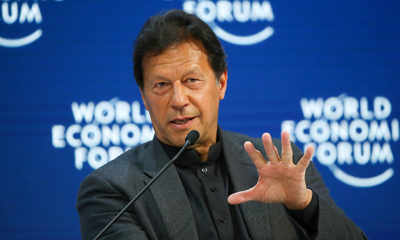- News
- India News
- Will China's effort see Pakistan out of FATF 'Grey List'? All you need to know
Trending
This story is from January 24, 2020
Will China's effort see Pakistan out of FATF 'Grey List'? All you need to know
At a meeting of the Financial Action Task Force held in Beijing, Islamabad submitted its compliance report and got support from the FATF current chair and its "all-weather friend" China and a few Western powers. The next plenary of the FATF will be held in February in Paris and Pakistan needs just 12 votes out of 39 to exit the 'Grey List' and move to 'White List'.

Key Highlights
- Pakistan may be out of the 'Grey List' of the international terror financing watchdog Financial Action Task Force (FATF) next month due to the active support of China and tactical support of some Western countries. We look at how the FATF listing works, its implications for Pakistan and also India —
- How can Pakistan get out of the 'Grey List'?
At a meeting of theFinancial Action Task Force (FATF) held in Beijing, Islamabad submitted its compliance report and got support from theFATF current chair and its "all-weather friend" China and a few Western powers. "The next plenary of the FATF will be held in February in Paris and Pakistan needs just 12 votes out of 39 to exit the 'Grey List' and move to 'White List'. There is a strong possibility of Islamabad getting enough support to exit the 'Grey List'," an Indian official privy to the development said. If Pakistan could convince a few Western nations with their report of taking action against terrorists, the country will be out of FATF 'Grey List', which will be a cause of worry for India. What is FATF ?
The Financial Action Task Force (on Money Laundering) was founded in 1989 on a G7 initiative to tackle money laundering. Initially, the organisation was tasked with monitoring legislative, financial and law-enforcement activities at both national and international levels. The role of FATF became prominent post the 9/11 terror attacks. Following which, it expanded its operations and included terror financing under its purview. In 2003, the FATF came out with a new set of guidelines where it asked state to confiscate proceeds of illegal transactions and form a financial intelligence unit to receive and probe suspicious transaction reports. The progress of the recommendations are monitored through 'peer reviews' or 'mutual evaluations'.- FATF Working
The FATF Secretariat is housed at the Organisation for Economic Co-operation and Development headquarters in Paris. During 1991 and 1992, the FATF expanded its membership from 16 to 28 members. In 2000, the FATF raised it to 31 members and has since increased it further to 39. There are nine FATF-style regional bodies (FSRBs) that have been established for the purpose of disseminating international standards throughout the world. Their main task is to devise systems for combating money laundering and terrorist financing in their respective regions. They are — 1) The Eurasian Group (EAG) 2) Asia/Pacific Group on combating money laundering (APG) 3) Caribbean Financial Action Task Force (CFATF) 4) Committee of Experts on the Evaluation of Anti-Money Laundering Measures and the Financing of Terrorism of the Council of Europe (MONEYVAL) 5) The Eastern and South African Anti Money Laundering Group (ESAAMLG) 6) Financial Action Task Force on Latin America (GAFILAT) 7) Inter-Governmental Action Group against Money Laundering in West Africa (GIABA) 8) Middle East & North Africa Financial Action Task Force (MENAFATF) 9) The Task Force on Money Laundering in Central Africa (GABAC) - Why are countries blacklisted or grey listed?
FATF grey lists a country which it considers as a safe haven for terror funding and money laundering. Though, inclusion in the list is not as severe as being black listed. It is a warning to the country to tackle the issues. If the country is not actively tackling money laundering or terror funding, it is then blacklisted. So far, only two countries have been blacklisted, they are Iran and North Korea. - Why Pakistan has a problem with FATF?
This is not the first time that Pakistan was placed on the grey list. Earlier, it was on the list twice. In the latest instance, Pakistan has been kept on the list since June 2018 and the FATF has asked Pakistan to execute a 27-point action plan. The deadline for implementing the plan was set for September 2019. Islamabad has been under the radar for not dealing with terror financing involving groups like the Lashkar-e-Taiba and Jaish-e-Mohammed, among others. On August 22, the FAFT's Asia-Pacific Group on Money Laundering, placed the Imran Khan-led government under Enhanced Expedited Follow up List (Blacklist) for its failure to meet standards. - How does it affect India?
A lot actually. India has been at the receiving end of Pakistani terror for years now. Imran Khan’s government and those before him have done little to address the issue. During the FATF plenary sessions, various countries including UK, Germany, and France have repeatedly asked Pakistan to tackle the issue. If Pakistan is taken off the list, it may result in upsurge in terror financing in the country. - Pakistan blames India for pushing it on the FATF blacklist
Last year, the Pakistan government submitted a compliance report on its 27-point action plan to the Financial Action Task Force (FATF). In the past, Pakistan Prime Minister Imran Khan had alleged that New Delhi was actively trying to push Islamabad on the blacklist. The reasoning, Imran added was simple. This, in turn, would lead to severe international sanctions on Pakistan and in turn bankrupt Islamabad, which has been going through one of its worst economic crisis in recent times.
End of Article
FOLLOW US ON SOCIAL MEDIA










